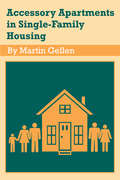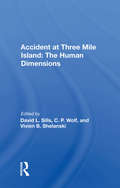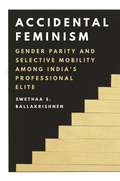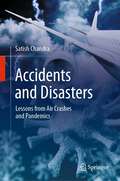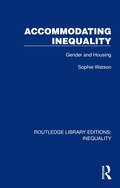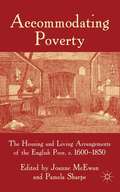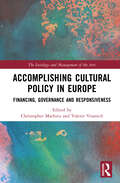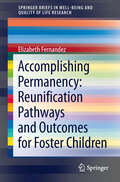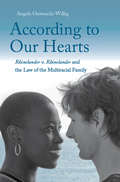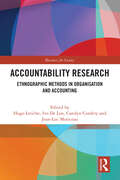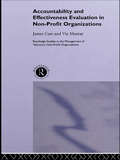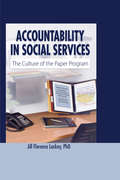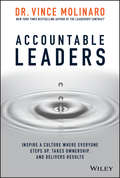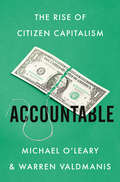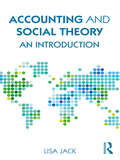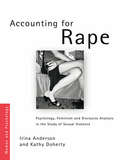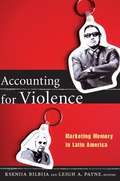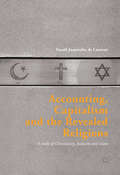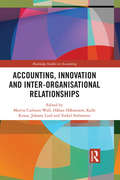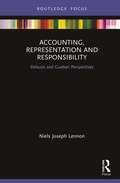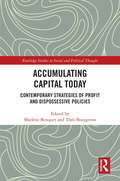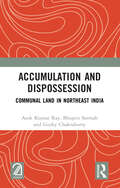- Table View
- List View
Accessory Apartments in Single-family Housing
by Martin GellenAs the reproduction cost of housing has increased, consumers have made intensive use of existing dwellings. Conversions of the housing stock have regained prominence as a source of supply. This book introduces the accessory apartment and assesses its potential as an emerging resource for meeting local and national housing needs. Although accessory apartments help meet some of the nation's housing needs, they are not entirely without problems. Some of these are environmental problems, such as physical alterations that are out of character with the design and appearance of surrounding structures, while other problems are cultural and ideological. The accessory apartment in a single-family house deviates from the image of housing, family, and neighborhood that prevails in American culture. It symbolizes a change in the way the single-family house is used and the kinds of people who live in it. These changes clash with the traditional meanings attached to the categories of residential zoning. Martin Gellen evaluates and answers the following questions throughout the text: How do we live with accessory apartments? Control their number? Ensure their soundness?--and maintain neighborhood standards? He focuses on the physical planning problems of conversions and examines the zoning issues they raise. This includes a realistic appraisal of the purposes of density and occupancy controls in exclusive single-family districts. The author provides new methods for regulation of density and occupancy which permit more flexible use of single-family housing to meet the housing needs of a more diverse population. Whether in an aging suburb or new tract, the accessory apartment is a current challenge. This book provides a clear headed approach toward a popular trend in the ever changing housing industry.
Accident At Three Mile Island: The Human Dimensions
by David L. Sills C. P. Wolf Vivien B. ShelanskiThe nuclear accident at Three Mile Island in March 1979 was as much a social-systems failure as it was an engineering failure. It raised questions not only about the regulation and management of nuclear-power plants but also about the effects of nuclear accidents on the community, on society, and on the total controversy surrounding nuclear energy. Questions were also raised about public perceptions of the risks of high technology. At the request of the President's Commission on the Accident at Three Mile Island (the Kemeny Commission), the Social Science Research Council commissioned social scientists to write a series of papers on the human dimensions of the event. This volume includes those papers, in revised and expanded form, and a comprehensive bibliography of published and unpublished social science research on the accident and its aftermath.
Accidental Feminism: Gender Parity and Selective Mobility among India’s Professional Elite
by Swethaa S. BallakrishnenExploring the unintentional production of seemingly feminist outcomes In India, elite law firms offer a surprising oasis for women within a hostile, predominantly male industry. Less than 10 percent of the country’s lawyers are female, but women in the most prestigious firms are significantly represented both at entry and partnership. Elite workspaces are notorious for being unfriendly to new actors, so what allows for aberration in certain workspaces?Drawing from observations and interviews with more than 130 elite professionals, Accidental Feminism examines how a range of underlying mechanisms—gendered socialization and essentialism, family structures and dynamics, and firm and regulatory histories—afford certain professionals egalitarian outcomes that are not available to their local and global peers. Juxtaposing findings on the legal profession with those on elite consulting firms, Swethaa Ballakrishnen reveals that parity arises not from a commitment to create feminist organizations, but from structural factors that incidentally come together to do gender differently. Simultaneously, their research offers notes of caution: while conditional convergence may create equality in ways that more targeted endeavors fail to achieve, “accidental” developments are hard to replicate, and are, in this case, buttressed by embedded inequalities. Ballakrishnen examines whether gender parity produced without institutional sanction should still be considered feminist.In offering new ways to think about equality movements and outcomes, Accidental Feminism forces readers to critically consider the work of intention in progress narratives.
Accidental Wilderness: The Origins and Ecology of Toronto’s Tommy Thompson Park
by Walter H. KehmOnce referred to as Toronto’s “accidental wilderness,” Tommy Thompson Park is now recognized as a fortuitous urban miracle. Initially created as a landfill site on the city’s rapidly developing waterfront, the park’s physical and ecological footprint have grown dramatically. Forests, grasslands, and wildlife now thrive – all within a stone’s throw of some of the most densely populated areas of North America’s fourth-largest city. Accidental Wilderness is a rich and lyrical collection of essays curated by internationally recognized landscape architect and original designer of Tommy Thompson Park, Walter H. Kehm, complemented by a stunning collection of photographs by renowned landscape photographer Robert Burley. The book explores the city’s port origins; the park’s master plan principles and design; the native-plant succession process; the park’s unique flora and fauna; public advocacy; and public recreation in the park and its effect on mental, physical, and spiritual health. In an era where the looming dangers associated with climate change affect our daily lives, Tommy Thompson Park offers a hopeful narrative about how nature can flourish in, and contribute to, the well-being of twenty-first-century cities.
Accidents and Disasters: Lessons from Air Crashes and Pandemics
by Satish ChandraThis book deals with the contemporary subject of perception of risk and its influence on accidents and disasters. The contents examine the conventional viewpoints on human errors, incubation of errors, complexity and organisational deviance as a cause for accidents. Work of Mary Douglas with regard to risk, Charles Perrow's work on the normal accident theory and Diane Vaughn's theory on normalisation of deviance are examined from a fresh perspective in this book. It also discusses prominent accidents in aviation, space, nuclear energy, automotive and healthcare, using the pandemic and Boeing 737 Max as a backdrop to study accidents and disasters. It further explores the background and similarities to these events and addresses the core issues such as the state of regulation, the worldview of the sociologists, and proposes that mental models of complex systems, avarice and risk for gain as other possibilities for accidents. Using the concept of nudge in behavioural economics and the Elinor Ostrom’s viewpoint on regulating for common good, it suggests a way forward through the High Reliability Organisation Theory (HRO) leading to enhanced risk perception. The book will be of interest to those who would like to understand the need to incorporate risk perception into regulation, engineers and scientists, professionals and policy makers working in the areas of disaster and risk management, technology areas like aviation, nuclear plants, space and healthcare, students of the sociology of risk and of course the general reader.
Accommodating Inequality: Gender and Housing (Routledge Library Editions: Inequality #9)
by Sophie WatsonOriginally published in 1988, Accommodating Inequality provides a basis for a radical re-think of housing policy and provision in Australia from a gender perspective. It explores the way that housing in Australia helped to produce patriarchal family structures and simultaneously contributed to the dependence of women on men. At the time the book was originally published housing policy at a theoretical or research level was less explored. Issues such as marginalisation, poverty and low income, domestic responsibility are discussed in relation to housing. The book raised new questions and challenged old debates and provides a clear framework within which feminist housing policy can be situated.
Accommodating Poverty
by Joanne Mcewan Pamela SharpeThis book offers a detailed examination of the living arrangements and material circumstances of the poor betweeen 1650 and 1850. Chapters investigate poor households in urban, rural and metropolitan contexts, and contribute to wider investigations into British economic and social conditions in the long Eighteenth century.
Accomplishing Cultural Policy in Europe: Financing, Governance and Responsiveness (The Sociology and Management of the Arts)
by Valerie Visanich Christopher MathieuThis book investigates the activities undertaken by the variety of actors that contribute to accomplishing cultural policy in Europe. These range from policy formulation and administration at the national and local levels, to artistic and cultural production activities to institutional governance. Arts and culture are an essential component to individual and collective quality of life. States, regions and municipalities increasingly recognize this intrinsic importance, as well as the instrumental values of the arts and culture. This has led to an increased interest in cultural policy, usually focusing on the policy process and policy effects. How cultural policy is accomplished is a matter of correspondingly increased importance, but less researched and understood. This volume shows how accomplishing cultural policy encompasses a vast expanse of activities, all unique but bound together as part of the continuous process of producing publicly subsidized art and culture for social and aesthetic purposes. The chapters also explore a range of thematic tensions that commonly arise in accomplishing cultural policy, such as the commercialization of arts and culture and counter-reactions; the challenges and means of promoting inclusiveness; the politics and effects of funding of the arts and culture; and good governance and vested interests in the arts and culture. Read together, these vivid case studies present a broad and unique picture of the wider and interconnected accomplishing process by expounding on the middle-ground between the policy formulation process and artistic and cultural production. Adding a novel conceptual formulation to studies of cultural policy, this book will appeal to practitioners, scholars and advanced students with interests in the sociology of the arts and culture, arts and culture management, cultural policy and cultural governance.
Accomplishing Permanency: Reunification Pathways And Outcomes For Foster Children (SpringerBriefs in Well-Being and Quality of Life Research #7)
by Elizabeth FernandezReunification is a primary goal of foster care systems and the most common permanency planning decision. It is defined as the return of children placed in protective care to the home of their birth family and used to describe the act of restoring a child in out-of-home care back to the biological family. Yet reunification decision-making and the process of reintegrating children into birth families remains under researched. This Brief takes a look at family reunification knowledge and research in Australia where there is evidence that most children placed in protective care are eventually reunited with their birth parents. It explores how a knowledge of reunification decision making and outcomes can contribute to strengthening practice and informing policy formulation and program planning in Child Welfare.
According to Our Hearts
by Angela Onwuachi-WilligThis landmark book looks at what it means to be a multiracial couple in the United States today. According to Our Hearts begins with a look back at a 1925 case in which a two-month marriage ends with a man suing his wife for misrepresentation of her race, and shows how our society has yet to come to terms with interracial marriage. Angela Onwuachi-Willig examines the issue by drawing from a variety of sources, including her own experiences. She argues that housing law, family law, and employment law fail, in important ways, to protect multiracial couples. In a society in which marriage is used to give, withhold, and take away status--in the workplace and elsewhere--she says interracial couples are at a disadvantage, which is only exacerbated by current law.
Accountability Research: Ethnographic Methods in Organisation and Accounting (Business for Society)
by Hugo Letiche Jean-Luc Moriceau Ivo De Loo Carolyn CorderyThis book discusses (auto- )ethnographies of accountability, undertaken (in close collaboration) by a multinational group of accounting and organization theory researchers over a period of three years. The key assumption underlying the book is that accountability is inherently an identity- creating process where the study of account- making has to be done participatively, with radical openness to the one(s) being researched, as well as to their context. That openness we call ‘ethnography’. The values or assumptions inherent to the practices of account and identity-making, in a specific context, are what (auto- )ethnographies seek to describe and identify. These values and assumptions warrant critical, ethical reflection, and this is what the researchers presented here have tried to provide.The chapters in this book all are mini- studies of relatedness. The scale of examination is intimate; the reflections provided by the researchers are mainly methodological.This book is of interest to accounting and organization theory students and scholars who believe that accountability can fruitfully be studied through (auto-) ethnography. The book extends currently existing views on how accountability can be handled and discharged between researchers and their researched, when local, intimate settings are studied.
Accountability and Effectiveness Evaluation in Nonprofit Organizations (Routledge Studies In The Management Of Voluntary And Non-profit Organizations Ser. #Vol. 4)
by James Cutt Vic MurrayThis unique volume provides new perspectives on assessing the performance of nonprofit organizations whilst meeting the information needs of decision-makers, both internal (such as resource-providers, regulators and clients), and external (including boards, managers, staff and volunteers).Whilst most discussions of accountability focus exclusively
Accountability in Social Services: The Culture of the Paper Program (Haworth Health and Social Policy Series)
by Jill Florence LackeyAccountability in Social Services examines how - and why - social and human services programs can function even though they are monitored by written communication instead of face-to-face interaction. Author Jill Florence Lackey draws on her experience as a consultant for more than 50 social programs and as director of two nonprofit organizations to demonstrate the strong need for accountability mechanisms and an ethics-based leadership when running social service programs. This unique book walks you through the process of how “paper programs” emerge and operate, the monitoring mechanisms that are - and aren’t - in place during program operations, and recommendations to increase accountability in the social service delivery system.The book examines programs focusing on: youth aftercare adolescent health drug prevention rural community development crime prevention violence intervention services to the homeless and more.Accountability in Social Services concludes with recommendations for organized action by consumer groups to increase responsibility in the social service delivery system. This book is invaluable as a resource for students, teachers, and practitioners working in social work and welfare, evaluation, organizational leadership, public policy, applied anthropology, and consumer science, including local organizations such as PIRGs (Public Interest Research Groups).
Accountable Leaders: Inspire a Culture Where Everyone Steps Up, Takes Ownership, and Delivers Results
by Vince MolinaroProven methods to push your organization to its maximum potential with responsible leadership Accountable Leaders is the real-world guide to propelling your business to extraordinary levels of performance and achievement. Leadership accountability is a major issue in organizations around the globe. Research has shown that teams and individual employees are overwhelmingly dissatisfied with the degree of accountability demonstrated by their leaders. Effective teams need responsible and accountable leaders—the solution seems simple. Yet, thousands of businesses are struggling with mediocre performance and widening gaps in leadership. This essential resource provides practical and no-nonsense strategies to transform any organization into a cohesive, highly motivated culture of accountable leaders and fully committed teams. Bestselling author Dr. Vince Molinaro shares his proven methods of optimal leadership accountability, providing a step-by-step blueprint for leaders in any organization. Developed from years of experience helping Fortune 500 companies build strong leaders and effective teams, this book will enable you to: Build strong leadership accountability to leverage competitive advantage, increase team performance, and close the leadership gap in your organization Understand why gaps in leadership occur and recognize accountability issues in your own organization Develop an effective strategy to instill a culture of accountability and responsibility in your business Identify and implement organizational practices that encourage accountable leadership throughout your management structure Accountable Leaders is a vital guide for anyone who leads a team: from managers and supervisors, to CEOs and CHROs. This invaluable guide will provide the tools and knowledge to take you and your organization to incredible levels of performance and achievement.
Accountable: The Rise of Citizen Capitalism
by Michael O'Leary Warren Valdmanis“More than ever before, this is the book our economy needs.” – Dr. Rajiv Shah, president of the Rockefeller Foundation“Unwilling to settle for easy answers or superficial changes, O’Leary and Valdmanis push us all to ask more of our economic system.” – Senator Michael F. BennetThis provocative book takes us inside the fight to save capitalism from itself.Corporations are broken, reflecting no purpose deeper than profit. But the tools we are relying on to fix them—corporate social responsibility, divestment, impact investing, and government control—risk making our problems worse.With lively storytelling and careful analysis, O’Leary and Valdmanis cut through the tired dogma of current economic thinking to reveal a hopeful truth: If we can make our corporations accountable to a deeper purpose, we can make capitalism both prosperous and good.What happens when the sustainability-driven CEO of Unilever takes on the efficiency-obsessed Warren Buffett? Does Kellogg’s—a company founded to serve a healthy breakfast—have a sacred duty to sell sugary cereal if that’s what maximizes profit? For decades, government has tried to curb CEO pay but failed. Why? Can Harvard students force the university to divest from oil and gas? Does it even matter if they do?O’Leary and Valdmanis, two iconoclastic investors, take us on a fast-paced insider’s journey that will change the way we look at corporations. Likely to spark controversy among cynics and dreamers alike, this book is essential reading for anyone with a stake in reforming capitalism—which means all of us.
Accounting and Social Theory: An introduction
by Lisa JackIs society possible without accounting? In speech or in writing, we communicate actions, plans and decisions using numbers, calculations, words and images. Although accounting research is dominated by quantitative analyses, the role of accounting in society is firmly established over thousands of years. In this concise book, Lisa Jack demonstrates the power of social theory in expanding the value of accounting research. Accounting and Social Theory: An introduction includes advice on research problems as well as guidance on fertile areas for new research. The tools, techniques and developments covered by the author help readers to see social research in accounting as the study of the use, misuse and abuse of accounting communications by people and the effects that this has on social relationships. Stories of accounting in war, agriculture and food, gender, health and other areas illustrate the ways in which the threads of accounting run through society. Having emerged from the author’s wealth of teaching experience, this book provides a student-focused treasure trove that illuminates the field for early-career researchers in accounting and established academics looking to expand the impact of their work.
Accounting for Affection
by Caroline CastiglioneAccounting for Affection examines the multifaceted nature of early modern motherhood by focusing on the ideas and strategies of Roman aristocratic mothers during familial conflict. Illuminating new approaches to the maternal and the familial employed by such women, it demonstrates how interventions gained increasing favor in early modern Rome.
Accounting for Rape: Psychology, Feminism and Discourse Analysis in the Study of Sexual Violence (Women and Psychology)
by Irina Anderson Kathy DohertyAccounting for Rape presents an original perspective on the subject of rape, focusing on both female and male sexual violence. The authors investigate everyday beliefs about rape, to examine how blaming the victim and the normalization of rape are achieved by people in a discussion about sexual violence. They synthesize discursive psychology and a feminist standpoint to explore precisely how rape and rape victimhood are defined in ways that reflect the social, political and cultural conditions of society. By analysing conversational data, Anderson and Doherty suggest that the existing social psychological experimental research into rape and rape perception fails to analyse the subtlety and political significance of rape supportive reasoning. Accounting for Rape provides a critical interrogation of the dominant theories and methodologies, focusing on: How the gender and sexual orientation of alleged victims and perpetrators is crucial to social participants when making sense of a rape report and in apportioning blame and sympathy How arguments that are critical of alleged victims are built in ways that are 'face saving' for the participants in the conversations, and how victim-blaming arguments are presented as 'common sense'. The potential of applying this approach in both professional and academic contexts to promote attitude change. The book will be of great interest to those studying social and clinical psychology, cultural studies, sociology, women's studies and communication studies.
Accounting for Violence: Marketing Memory in Latin America
by Leigh A. Payne Ksenija BilbijaAccounting for Violence offers bold new perspectives on the politics of memory in Latin America. Scholars from across the humanities and social sciences provide in-depth analyses of the political economy of memory in Argentina, Brazil, Chile, Mexico, Peru, and Uruguay, countries that emerged from authoritarian rule in the 1980s and 1990s. The contributors take up issues of authenticity and commodification, as well as the "never again" imperative implicit in memory goods and memorial sites. They describe how bookstores, cinemas, theaters, the music industry, and television shows (and their commercial sponsors) trade in testimonial and fictional accounts of the authoritarian past; how tourist itineraries have come to include trauma sites and memorial museums; and how memory studies has emerged as a distinct academic field profiting from its own journals, conferences, book series, and courses. The memory market, described in terms of goods, sites, producers, marketers, consumers, and patrons, presents a paradoxical situation. On the one hand, commodifying memory potentially cheapens it. On the other hand, too little public exposure may limit awareness of past human-rights atrocities; such awareness may help to prevent their recurring. Contributors. Rebecca J. Atencio, Ksenija Bilbija, Jo-Marie Burt, Laurie Beth Clark, Cath Collins, Susana Draper, Nancy Gates-Madsen, Susana Kaiser, Cynthia E. Milton, Alice A. Nelson, Carmen Oquendo Villar, Leigh A. Payne, José Ramón Ruisánchez Serra, Maria Eugenia Ulfe
Accounting, Capitalism and the Revealed Religions: A Study of Christianity, Judaism and Islam
by Vassili Joannidès de LautourThis book analyses the bearing of global monotheistic faiths towards the philosophy and practice of record keeping and accounting throughout history. The author offers a comprehensive discussion of the literal and figurative processes of taking account and ascribing accountability that link religions such as Christianity, Judaism and Islam. Chapters address theology and accounting in tandem with social behaviours to demonstrate how auditing and calculating customs permeate practising religions. This book first highlights how the four monotheisms have viewed and incorporated accounting historically, and then looks forward to the accounting debates, technologies and traditions in today’s world that derive from these religious customs. Drawing heavily on the writings of Max Weber and Werner Sombart, the author demonstrates that accounting and capitalism have religious roots far beyond the Protestant ethic.
Accounting, Innovation and Inter-Organisational Relationships (Routledge Studies in Accounting)
by Håkan Håkansson Martin Carlsson-Wall Kalle Kraus Johnny Lind Torkel StrömstenSuccessful innovation is a true challenge and especially when today’s companies are intertwined in close inter-organisational relationships and networks with e.g. customers and suppliers. Research has indicated that accounting can play important roles in such innovation processes, but there is little in-depth systematic knowledge about this issue. Accounting, Innovation and Inter-Organisational Relationships gathers leading researchers from all around the world to argue for the importance of more systematic knowledge about accounting, innovation and inter-organisational relationships. Accounting, Innovation and Inter-Organisational Relationships thus becomes an important source for researchers and practitioners interested in accounting and inter-organisational relationships as well as the related disciplines of management, marketing, innovation and strategy.
Accounting, Representation and Responsibility: Deleuze and Guattarí Perspectives (Routledge Focus on Accounting and Auditing)
by Niels Joseph LennonIn organizations, accounting produces organizational knowledge that affects decision-making and managerial action. Companies placing importance on shareholder value sometimes tend to elevate accounting to a higher truth criterion for justifying managerial actions. Yet, the nature of accounting renders it difficult to argue that accounting information necessarily produce a better basis for decision-making than arguments which are not based on accounting. This is because, as previous research has also argued, accounting counts some things but omits many others, while managers are accountable for much more than what accounting actually counts. Using a theoretical apparatus from Deleuze and Guattarí, this book illustrates that accounting-based actions such as making management decisions, maintaining organisational responsibility and hierarchical control are manifestations of the ways in which accounting is composed. This concise introduction will be invaluable for researchers and advanced students of management accounting exploring responsibility accounting and accountability.
Accounts of China and India: Accounts Of China And India And Mission To The Volga (Library of Arabic Literature #55)
by Abū Zayd al-SīrāfīThe ninth and tenth centuries witnessed the establishment of a substantial network of maritime trade across the Indian Ocean, providing the real-life background to the Sinbad tales. An exceptional exemplar of Arabic travel writing, Accounts of China and India is a compilation of reports and anecdotes about the lands and peoples of this diverse territory, from the Somali headlands of Africa to the far eastern shores of China and Korea. Traveling eastward, we discover a vivid human landscape—from Chinese society to Hindu religious practices—as well as a colorful range of natural wilderness—from flying fish to Tibetan musk-deer and Sri Lankan gems. The juxtaposed accounts create a kaleidoscope of a world not unlike our own, a world on the road to globalization. In its ports, we find a priceless cargo of information. Here are the first foreign descriptions of tea and porcelain, a panorama of unusual social practices, cannibal islands, and Indian holy men—a marvelous, mundane world, contained in the compass of a novella.An English-only edition.
Accumulating Capital Today: Contemporary Strategies of Profit and Dispossessive Policies (Routledge Studies in Social and Political Thought)
by Marlène Benquet Théo BourgeronThis book explores the renewal of forms of capital accumulation and the institutions that shape it. It focuses on three main sources of accumulation: the extraction of profit through labor and the commodification of nature, financial speculation and the ways in which profit is converted into wealth. It thus offers a new understanding of the economic and political logics of capital accumulation within capitalism in the 21st century. It shows the recomposition of the sources of profit, from the traditional mechanisms of labor exploitation to the contemporary logics of speculation and dispossession. Bringing together the work of scholars who study the social fabric of capitalist accumulation, Accumulating Capital Today goes beyond disciplinary frontiers to describe how capital is accumulating in a world threatened by social and environmental collapse. This book heralds the emergence of "accumulation studies" and will be of interest to researchers in sociology, anthropology, politics, political economy, geography and economics.
Accumulation and Dispossession: Communal Land in Northeast India
by Gorky Chakraborty Asok Kumar Ray Bhupen SarmahThis book sketches a road map of privatisation, accumulation and dispossession of communal land in the tribal areas of North East India from pre-colonial times to the neo-liberal era.Spread over five chapters, this study unfolds the privatisation of communal land in the backdrop of a larger theoretical and historical canvas. It deals with the different institutional modes of privatisation, accumulation and dispossession of communal land, the changes in land use and cropping patterns, the changes in land relations and the land-based identity of the tribal community as a result. The conclusive chapter makes a broader reflection of the grand narrative of privatisation, accumulation and dispossession of communal land in North East India.This title is co-published with Aakar Books. Print edition not for sale in South Asia (India, Sri Lanka, Nepal, Bangladesh, Pakistan and Bhutan)
